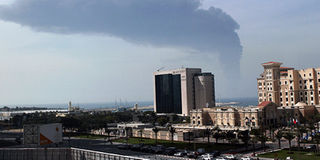Kenyans jump ship as Dubai sinks

Dubai, the Persian Gulf city. Photo/REUTERS
An unknown number of Kenyan workers in Dubai could be headed home as the global economic crunch takes its toll on the Persian Gulf city. And, like many other foreign workers who make up 90 per cent of Dubai’s population, the Kenyans are victims of ongoing layoffs.
With economic growth estimated to dip to less than 3 per cent this year, down from 8 per cent last year, Dubai firms – and largely the United Arab Emirates – are drastically cutting down on staff.
A report by banking giant HSBC has indicated that almost $75 billion (Sh5,250 billion) worth of property projects have been put on hold in Dubai. In its report, HSBC lists 59 projects under review, including eight that have been cancelled. High-cost residential and commercial developments are most at risk.
A large number of Kenyans in Dubai work in the construction and infrastructure, hotel and entertainment and transport industries. Many more are employed as domestic workers. Another portion of the population is involved in business , going to buys goods which they later sell back home in Kenya.
Hotels have also been affected, with revenue said to have fallen by a quarter in December, reflecting the fall in the number of visitors following the global downturn. In 2007, the government of Dubai said it wanted to grow at 11 per cent to 2011.
With Dubai’s economy in free fall, newspapers have reported that more than 3,000 cars lie abandoned in the parking lot at the Dubai Airport, left by fleeing, debt-ridden foreigners — who risk imprisonment if they failed to pay their bills.
Some have left behind credit cards inside the cars, with notes of apology taped to the wind shield. Jobless people in Dubai lose their work visas and must leave within a month.
According to Dubai Naturalization and Residency Department, 54,684 residency visas were cancelled in January, compared to 29,418 in January 2008. This translates to about 1,764 a day. But 1,088 visas were issued daily in January, 1,000 fewer than in the same period of 2008.
Private sector visas were the most cancelled. In October, 23,287 visas were cancelled while 25,609 were cancelled in November and 23,814 in December. Domestic help visas were the least cancelled, with just 2,686 cancelled in October while 3,031 and 2,906 were cancelled in November and December respectively.
Dubai has experienced reduced spending, more housing vacancies and lower real estate prices, in a downward spiral that has left parts of Dubai — once hailed as the economic superpower of the Middle East — looking like a ghost town.
A report by the New York Times says no one knows how bad things have become, though it is clear that tens of thousands have left, real estate prices crashed and scores of Dubai’s construction projects suspended or cancelled.
But with the government unwilling to provide data, rumours are bound to flourish, damaging confidence and further undermining the economy.
The Persian Gulf is cushioned by vast oil and gas wealth, and some who lost jobs in other parts of the world due to the financial melt-down began applying for jobs in Dubai.
But Dubai, unlike Abu Dhabi or nearby Qatar and Saudi Arabia, does not have its own oil, and had built its reputation on real estate, finance and tourism.



